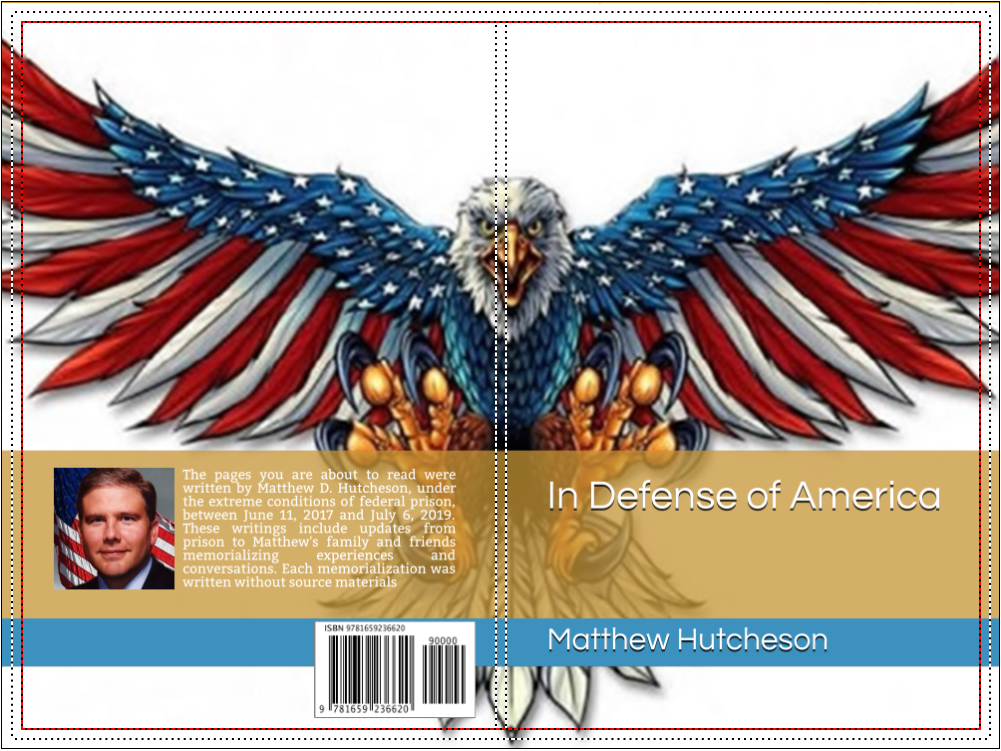“The American Hypothesis“
© 2020 Matthew D. Hutcheson
•••••
The following excerpt is the Foreword and Chapter 1 from Matthew D. Hutcheson’s book, In Defense of America. It is shared freely with you this Memorial Day, 2020, with the hope it will bless and inspire you as it has so many others. The entire “The American Hypothesis” was written by Matthew D. Hutcheson for a fellow inmate’s college class while at FCI Lompoc, California. It was published by TED.com and most recently, by the Microsoft® Education blog.
For more information, visit:
•••••
Foreword
Will America be Ok?
It is a question on many people’s minds today.
In that special comforting way for which Matthew D. Hutcheson has come to be known, he not only answers the question, “Will America be Ok?” in the affirmative, but he also provides desperately needed insight and comfort to a nation groaning under the stress and weight of political strife.
In Defense of America clears away the fog of
confusion which has settled upon America’s younger generations. Is America evil? What about its founders? Were they evil? Will America survive?
Matthew helps the reader understand why America is truly exceptional and why the Stars and Stripes shall forever wave. He shares memorialized conversations with young inmates who ultimately come to understand why they should love America and continue to believe in her.
In many ways, Matthew D. Hutcheson is like a modern-day Dean Alfange, the late, skilled politician who wrote the award-winning essay, “An American Creed,” in the 1950s.
The essay originally appeared in This Week Magazine. Several years later the essay was published in Reader’s Digest in the October, 1952 issue, and once again in the January, 1954 issue.
The Freedoms Foundation at Valley Forge gave Alfange an award for the composition in 1952.
Here is Alfanges’ essay:
“I do not choose to be a common man. It is my right to be uncommon. I seek to develop whatever talents God gave me—not security. I do not wish to be a kept citizen, humbled and dulled by having the state look after me. I want to take the calculated risk; to dream and to build, to fail and to succeed. I refuse to barter incentive for a dole. I prefer the challenges of life to the guaranteed existence; the thrill of fulfillment to the stale calm of utopia. I will not trade freedom for beneficence nor my dignity for a handout. I will never cower before any earthly master nor bend to any threat. It is my heritage to stand erect, proud and unafraid; to think and act myself, enjoy the benefit of my creations and to face the world boldly and say – ‘This, with God’s help, I have done.’ All this is what it means to be an American.”
Dean Alfange
•••••
It is as though those words were spoken by Matthew D. Hutcheson in the first instance. You will see that Alfange’s words apply to Hutcheson as they do to himself.
The contents of this small book have had a profound and life-changing impact on the lives of many.
I believe it will likewise change your life and that of your loved ones.
Lee Ofner, DDS
•••••
Chapter 1
The American Hypothesis
September 25, 2019
© Matthew D. Hutcheson 2017-2019
The following inspiring message was originally written June 11, 2017 by Matthew D. Hutcheson, then incarcerated at FCI-Lompoc, as an email to his family. POSTED September 25, 2019 to Microsoft’s® Education Blog.
•••••
There are two local colleges here (I think both are out of Santa Barbara) which offer Associate degrees in a variety of subjects. The classes are usually full. In prison, every societal and cultural status is represented. There are rich and poor. There are educated and ignorant. There are the English proficient and the “just learning.” There are Asians, Europeans, Africans, South Americans, Eskimos, Polynesians, and everyone in between. The entire continuum is represented in the classes of the local colleges.
One young man I met soon after I arrived here is Vietnamese. He goes by “John” and one of the classes he is taking is “American History 118.”
He and I have become friends, but as you can imagine, language is a barrier. When coupled with a lack of knowledge of American History with which most of us grew up, it makes for a very stressful time for him in class.
The visiting professor (“Professor Barker”) gave the American History class an assignment. I paraphrase John’s understanding of the assignment:
“GIVEN THE POLITICAL UNREST IN THE UNITED STATES, IN LIGHT OF A VERY ACRIMONIOUS ELECTION, AND IN A SEEMINGLY CHAOTIC CHANGE IN ADMINISTRATIONS, AND IN ALL OF THE INTERNATIONAL WARS AND FINANCIAL INSTABILITY AT HOME AND ABROAD, PLEASE DEVELOP A REASONABLE HYPOTHESIS FOR THE FUTURE OF AMERICA.”
My friend John was overwhelmed with this assignment. He did not have a clue what to write. So, he hunted down his buddy “Hutch” and asked for some help.
He and I worked on it together. Here is John’s finished paper:
•••••
If it is true that history repeats itself, then it is a plausible hypothesis that some (or perhaps all) of the historical scenarios considered in this course will occur again, in some form, in our immediate or long-term future. However, that thought is not the central idea in support of this short paper. My hypothesis revolves around a slightly different premise as follows:
“The social, financial, and economic forces that shape today’s America are no different from those which have worked to impact the America of our past.”
Using this basic premise as my starting point, we find ourselves confronted with some largely general questions about what it is to be an American – and whether or not our collective perception of the “American Experience” has changed significantly over time. But more specifically (and more to the point of this paper), we might approach the subject of American History by asking another, yet more subtle question:
“If the historical forces affecting America have at times been variable, then what constant of the ‘American Experience’ has allowed us to persist?”
I believe, as many others do, that it is the robust nature of the United States Constitution – more than anything else – which has acted to propel America forward and to ensure her dynamic progress. The United States Constitution anchors Americans, one and all, to a unique and unalienable set of principles; principles that serve to hold up our enduring national ideology – principles which are far superior to those of any other civilized nation.
But, what do I have for proof, you may ask? Well, as with so many other points, the measure of a nation’s greatness is often gauged by its finances. The United States, for example, leads the entire world in its steady and lavish production of gross domestic product – overmatching every competing country by an order of several magnitudes at least – including the out-producing of China by many, many trillions of dollars annually. Whether we attribute these facts to Divine Acts of Providence, or to the simple goodness of our founding principles (which are also given through Divine Providence), one point is absolutely certain:
America not only persists through conflict, she seems to thrive upon it.
However, you may ask, “Are we not living in especially dangerous times? Is the country not in an absolute state of peril, more so than at any other time in history?”
Well, frankly, the answer to that question, is “no, not really.” The America of today, if truth be told, is in no worse shape than she was ten, twenty, or even one hundred years ago. She is stronger and actually improving.
Here is why:
We nearly lost the Revolutionary War when on at least two separate occasions were it not for rogue winter storms which wrecked the Redcoats’ visibility in one instance and drove back their boats and warships in another. The Civil War was also nearly lost but for the Confederacy having misplaced its battle plans and strategic documents in an abandoned tent, later to be found by a Union scout.
These events are not luck. They are caused by a Being, more intelligent than, and superior to, us. We then conclude that this Supremely Intelligent and Benevolent Being wants America to exist and go on existing.
It might surprise most readers to know that America’s destiny has been absolutely littered by an almost bizarre series of impossibly close-calls, extending far beyond those of our Revolutionary and Civil Wars. Further examples include the United States’ narrowly winning the race against Germany to construct World War II’s first atomic bomb – and in the 11th hour to break the enigma code.
It is not the point of this short paper to showcase America’s propensity for running a tight race – although she has done just that. The point here is to highlight America’s iron-clad perseverance, which when considered in its proper historical context, has been absolutely miraculous.
So, what does history have to say, overall, about America? Is she good? Is she bad? Does Manifest Destiny actually exist, or was it all just a bit of excessive exuberance coupled with the coincidences and circumstances of the day? If we could pick just one universal trait to define our nation, what might that trait be?
Although this last question is a tough one, to be sure, our Nation has existed for long enough for us to have a good look at her pedigree – and she is, by all accounts, unique. History has shown us, time and time again, that America’s people are a diverse and complicated bunch. We are a multi-talented tapestry of enormous untapped potential – quietly surging, nearly glowing – as we bend and sway against the political and economic wind gusts of the day.
It is precisely these qualities, a sense of unpredictability tempered with hope, which has somehow been infused into our Constitution – and is embodied there – stamping its manifest presence onto our destiny. Thus ordained, America has led us over, or through, almost every imaginable obstacle, surviving both reformation and greed, revolution and war – and as always, we will persist, we will adapt, we will prevail. America always will. It is the American Hypothesis.
© Matthew D. Hutcheson 2017-2019


Like!! I blog quite often and I genuinely thank you for your information. The article has truly peaked my interest.